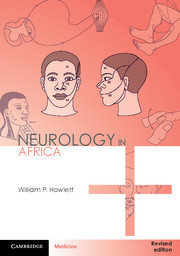Book contents
- Frontmatter
- Dedication
- Contents
- PREFACE
- Acknowledgments
- Part II Neurological Disorders
- 3 Public Health
- 4 Epilepsy
- 5 Stroke
- 6 Neurological Infections
- 7 Protozoal Andhelminthic Infections
- 8 Neurological Illness in HIV Disease
- 9 Coma and Transient Loss of Consciousness
- 10 Paraplegia Non Traumatic
- 11 Disorders of Peripheral Nerves
- 12 Cranial Nerve Disorders
- 13 Myopathies and Myasthenia Gravis
- 14 Movement Disorders and Motor Neurone Disease
- 15 Headache and Facial Pain
- 16 Intracranial Tumours
- 17 Dementia
- 18 Inherited Neurological Disorders
- 19 Head and Spinal Injury
- 20 Care in Neurology
- INDEX
- ABBREVIATIONS
- USEFUL WEBSITES
7 - Protozoal Andhelminthic Infections
from Part II - Neurological Disorders
- Frontmatter
- Dedication
- Contents
- PREFACE
- Acknowledgments
- Part II Neurological Disorders
- 3 Public Health
- 4 Epilepsy
- 5 Stroke
- 6 Neurological Infections
- 7 Protozoal Andhelminthic Infections
- 8 Neurological Illness in HIV Disease
- 9 Coma and Transient Loss of Consciousness
- 10 Paraplegia Non Traumatic
- 11 Disorders of Peripheral Nerves
- 12 Cranial Nerve Disorders
- 13 Myopathies and Myasthenia Gravis
- 14 Movement Disorders and Motor Neurone Disease
- 15 Headache and Facial Pain
- 16 Intracranial Tumours
- 17 Dementia
- 18 Inherited Neurological Disorders
- 19 Head and Spinal Injury
- 20 Care in Neurology
- INDEX
- ABBREVIATIONS
- USEFUL WEBSITES
Summary
This chapter is concerned with the main protozoal and helminthic infections affecting the nervous system in Africa. These include cerebral malaria, toxoplasmosis, and human African trypanosomiasis (HAT), neurocysticercosis, schistosomiasis and hydatid disease. The student should aim to be familiar with these, including life cycles, clinical presentations, diagnosis, management and prevention.
CEREBRAL MALARIA
Cerebral malaria is a severe neurological disease of the brain that is caused by Plasmodium falciparum and is characterized by fever, altered level of consciousness and laboratory evidence of malaria infection. The research definition of cerebral malaria is unrousable coma, (Glasgow coma scale ≤8 or Blantyre coma scale for young children ≤2 (Table 7.2) in the presence of a peripheral parasitaemia after other causes of coma have been excluded.
Epidemiology
Each year there are over 300 million new cases of malaria in Africa resulting in over 1 million deaths there, occurring mostly but not exclusively in children. Cerebral malaria is one of the most important complications. It is invariably fatal without treatment and each year there are over half a million new cases of cerebral malaria in Africa. Most cases occur in non immune children (<5 yrs) and the incidence declines progressively as children become older. Cerebral malaria also occurs in adults but much less frequently. The mortality rate in treated cerebral malaria in children is 15-20% and 10-15% in adults. Recent reports and clinical experience in Africa suggest that the overall burden of severe malaria is decreasing significantly there.
Pathophysiology of cerebral malaria
The mechanism of brain injury in cerebral malaria is not fully understood. The main theories involve parasite sequestration, endothelial dysfunction and injury with cytokine release and blood brain barrier dysfunction. The brain at post mortem in cerebral malaria is typically congested and darkened in colour (Fig 7.1). The histopathology shows many parasitized red blood cells (RBCs) sequestered in the capillaries and small blood vessels particularly in the grey matter and petechial perivascular ring haemorrhages in white matter (Fig 7.1). The sequestration is attributed to cytoadherence or the sticking of parasitized RBCs to vascular endothelium and to rosetting; the sticking of unparasitized RBCs around a parasitized RBC, which in turn may lead to congestion of the capillaries. These findings have led to the mechanical theory of decreased microcirculation or blocked capillaries being a main mechanism.
- Type
- Chapter
- Information
- Neurology in AfricaClinical Skills and Neurological Disorders, pp. 159 - 188Publisher: Cambridge University PressPrint publication year: 2015



